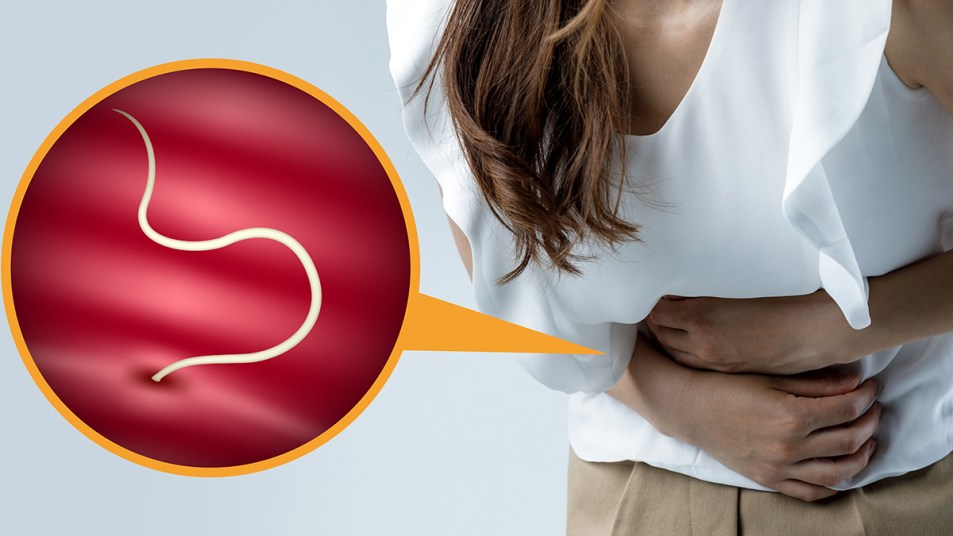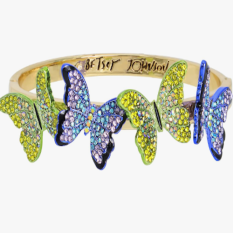CDC: 60+ Million Americans Are Infected With Sneaky Parasites — And They’re Making 80% of Women Over 50 Tired
The good news: Natural remedies can work wonders to clear up fatigue, GI issues, brain fog and bloat

You might think of parasites — and the diseases they cause — as a problem that will never affect you, and you wouldn’t be alone in that thought. But intestinal parasites affect humans and are not just a Third World concern: They affect millions of Americans. Indeed, according to the CDC, more than 60 million people in the US are infected with parasites. Explains Gordo Crozier, DO, an integrative physician in Orlando. “Because parasites are spread by pets, contaminated water and improperly handled food, they’re becoming an increasingly common health threat in the U.S.” And intestinal parasites thrive in warm weather, so risk rises in the summer.
And intestinal parasites in humans are far from harmless: They are a top cause of fatigue, says Ann Louise Gittleman, Ph.D., author of Guess What Came to Dinner? ($15.99, Amazon) Gittleman asserts that for eight in 10 women experiencing tiredness, GI issues, brain fog, and other vague symptoms, intestinal parasites are to blame. Adds functional medicine specialist Leo Galland, MD: “Because symptoms are so varied, parasites are often overlooked as the cause.”
Women over 50 are most at risk of harboring intestinal parasites since the production of stomach acid that helps kill the invaders drops rapidly with age. “Intestinal parasites in humans mostly come from food and water, so any decrease in stomach acid increases infection risk,” says Dr. Galland. Other sources of exposure: wilderness activities, pets, travel.
Intestinal parasites are rarely diagnosed
“Testing for parasites is notoriously inaccurate,” says Gittleman. But Dr. Galland advises asking your doctor to perform a rectal swab test if you’re frequently exhausted and experience two or more symptoms these symptoms: diarrhea, stomach pain, brain fog, skin rashes, gas, constipation, bloat, joint/muscle pain, or swollen lymph nodes. This will be more likely to reveal parasites than a traditional stool test.
“Because symptoms are so varied, parasites are often overlooked as the cause” says Dr. Galland. Gittleman calls parasites “energy vampires” explaining that “parasites damage the gut, steal nutrients from their host and pump out toxins, causing GI distress, fatigue and more.” The good news is that you can eradicate parasites at home for very little money simply by choosing foods that kill them and avoiding foods that feed them.
One woman’s journey to freedom from parasites
To learn more about how to discover if you have intestinal parasites and learn more about how to get rid of them, take a cue from Jazmin Light. When she started to feel exhausted and foggy and began experiencing GI symptoms, she never imagined parasites could be to blame. When antibiotics didn’t do the trick, she was able to treat the infection naturally — and regain her health. Read on to learn how she did it.

Jazmin was too tired to function
“My exhaustion began many years ago, a few weeks after returning from a trip to India, and I soon developed inexplicable fatigue and brain fog that made it nearly impossible to get out of bed for days, sometimes weeks,” recalls Jazmin. “Whenever I ate, I also felt gurgling and rumbling in my abdomen that felt like I was digesting stones for hours, followed by serious bouts of gas and constipation.
“After a few weeks of these confusing symptoms, I saw my doctor, who diagnosed me with intestinal parasites called blastocystis hominus. I was told that I could have contracted the parasites in India, but that they are also common in the United States.
Nothing Jazmin tried eased her symptoms
“A 10-day course of antibiotics, along with supplements to restore my digestive health, provided minimal relief, then a few weeks later, my symptoms returned, prompting a second round of the same treatment. That put me on a dizzying two-year cycle in which I took multiple rounds of antibiotics that destroyed my good gut flora instead of the parasites — and my disruptive symptoms returned after every course of medicine.
“My exhaustion and other symptoms lingered for two more years, making it impossible for me to have a traditional work schedule, so I opted for self-employment as a pianist and massage therapist to have freedom to sleep as often as needed. Then those careers stalled because of my lack of energy.
“I became depressed that I was unable to be the mother I wanted to be, and I feared that I would never have energy to take a walk or enjoy ‘little things’ in life, like being able to concentrate on a friendly conversation or even grocery shop without needing a nap immediately after.
“Then, my doctor had bleak news: My parasites were resistant to antibiotics and I needed to either live with them or cut pastries from my diet. He can’t be serious, I thought, devastated at the thought of giving up my beloved daily pastry. I mulled the doctor’s advice and cut out that pastry — however, over a few months, I didn’t see any significant improvement in my symptoms.
“For more than a decade, I continued dragging myself through the day, fighting my fatigue and other symptoms while trying to treat my parasites with every natural remedy I could read about or find, only for my symptoms to return.
How Jazmin finally found relief after years of suffering
“Then one day, I was talking to my mother, who was a holistic healer, and I realized it was time to stop consuming all refined sugar instead of simply avoiding pastries and obvious sweets.
“I became an avid label reader and was amazed how many products have sugar, like mayonnaise, spaghetti sauce, pickles and more. (Click through for 3 common foods that are full of hidden sugar.) Because I love sweets, it was extremely difficult to eliminate sugar, including all forms of concentrated sweeteners (honey, agave, corn syrup, dates, etc.) but then I discovered I can eat xylitol, erythritol, stevia and monk fruit without feeding bad gut bacteria, candida or the parasites (click through for an anti-candida diet that speeds weight loss). For flavor, I started seasoning foods like vegetables, healthy fats, grains and beans with garlic, ginger and more. Coconut oil, which I used to prepare vegetables and other foods, helped curb the yeast overgrowth I developed as a side effect of having too many rounds of antibiotics. (Click through for 3 delicious sips made with coconut oil.)
“Within days of eliminating sugar, my brain fog began to lift. And weeks later, my energy levels started rising. In a few months’ time, I was able to completely free myself of the decades of symptoms and even have energy to start a career teaching healing and couples’ massage.
“I’ve regained my health and I am so grateful to have a second chance a life! At 67, I’m feeling way better than years ago, and now have so much energy!”
Natural remedies that eradicate intestinal parasites in humans
In addition to cutting back on sugar to stop feeding the parasites, there are also a number of natural foods that actually kill the bad bugs.
Why cutting back on sugar works
Avoiding sugar helps starve parasites, so Gittleman advises cutting out sugary foods and drinks and loading up on leafy greens, carrots, cantaloupe, mangoes and chicken, which deliver vitamin A and zinc. “Parasites can’t hold on to the gut when the body has an adequate supply of these nutrients.” Also key: Cook with coconut oil. The body converts its monolaurin into lauric acid, a compound with potent antiparasitic activity.
How garlic and ginger work together to kill parasites
“Garlic is one of Mother Nature’s greatest weapons against harmful parasites,” says Michelle Schoffro Cook, PhD, author of The Probiotic Promise. “Unlike drugs that only work against one type of infection, garlic is an antiparasitic, antifungal, antiviral and antibacterial.” For even bigger benefits, combine garlic with ginger! Enjoying 2 cloves of garlic and 1 to 2 tsp. of ginger a day can eradicate parasites, suggests research in the European Journal of Clinical Microbiology & Infectious Diseases. Both boast compounds that have antiparasitic action.
How pumpkin seeds work wonders
In a study from China, 75% of people who ate ¼ cup of pumpkin seeds eliminated the bugs in one day. Credit goes to acids in the seeds that paralyze the bugs so they’re easier to expel.
The power of black walnut and wormwood
Black walnut is a traditional Native American remedy for parasites. And modern science confirms its effectiveness. “Black walnut contains antimicrobial agents that destroy parasites, their larvae and eggs,” Gittleman explains. Indeed, research reveals a black walnut compound called juglone has a powerful antiparasitic action. In research conducted at Howard University, it killed intestinal worms within 24 hours. What’s more, a British study determined juglone significantly inhibited growth of toxoplasma gondi, a microscopic parasite that infects more than 6 billion people worldwide.
As effective as black walnut is, Gittleman advises pairing it with wormwood. Another time-honored treatment, the herb has been used to eradicate parasites since ancient Egyptian times. A report in Parasitology Research found the sesquiterpiniods it contains destroyed plasmodium, the parasite responsible for malaria, within four days. Plus, a study in the Journal of Helminthology notes that wormwood’s activity against parasites was comparable to the prescription drug praziquantel. For more on the power of black walnut and wormwood to eradicate parasites, click through to Nutritionist: Energy Vampires Are Real — And Likely Living In Your Gut Right Now.
Keep reading for advice on how to treat other sneaky infections:
Are You Carrying H. Pylori? A Lot of Women Over 50 Are (and Don’t Know It)
Feeling Constantly Fatigued? It Could Be This Common (and Sneaky) Virus
This content is not a substitute for professional medical advice or diagnosis. Always consult your physician before pursuing any treatment plan.
A version of this article originally appeared in our print magazine, First for Women.













